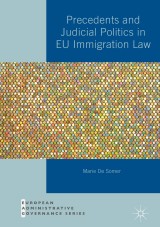Details

Precedents and Judicial Politics in EU Immigration Law
European Administrative Governance
|
106,99 € |
|
| Verlag: | Palgrave Macmillan |
| Format: | |
| Veröffentl.: | 27.07.2018 |
| ISBN/EAN: | 9783319939827 |
| Sprache: | englisch |
Dieses eBook enthält ein Wasserzeichen.
Beschreibungen
This study explores the use of precedents in the case law of the Court of Justice of the European Union (CJEU). It argues that a strategic use of precedent-based discourses aids the Court in developing its jurisprudence autonomously; that is, independent of the political preferences of EU member states. The study is based on a long-term assessment of CJEU case law in the politically sensitive area of immigration law. It traces the Court’s rulings in this area from the 1970s up until the most recent period. The study identifies a series of consistent discursive patterns that slowly, but surely, moved EU immigration law beyond what member states had intended. The work takes an interdisciplinary approach, engaging with both political science and legal discussions on the Court of Justice and its role in processes of European integration.
<div>Table of Contents.- 1. Introduction.- 2. The Court’s Role in Processes of European Integration.- 3. Precedents and Judicial Politics.- 4. Case Selection and Data.- 5. Identifying Member States’ Interests.- 6. Quantitatively Structuring Precedents.- 7. Qualitatively Charting Precedents.- 8. Precedents and Judicial Politics: Analytical Findings.- 9. Conclusions and Suggestions for Further Research.</div>
<div>Marie De Somer is Head of the Migration and Diversity Programme at the European Policy Centre in Brussels and a Guest Professor at the KU Leuven Law Faculty. She has previously worked at Maastricht University, The Netherlands, the European Commission and the Centre for European Policy Studies.<br></div>
<div>In this important book, Marie De Somer analyses the role of the European Court of Justice in EU family reunification policies. With its precedent-based argumentation the Court succeeds in moving the case law beyond what member states agreed to. Based on a mixed-methods approach and carefully avoiding problems of observational equivalence, De Somer breaks new ground in showing the autonomy of the Court. I cannot recommend this volume highly enough.</div><div>Susanne K. Schmidt, University of Bremen, Germany<br></div><div><br></div><div>This book explores the use of precedents in the case law of the Court of Justice of the European Union (CJEU). It argues that a strategic use of precedent-based discourses aids the Court in developing its jurisprudence autonomously; that is, independent of the political preferences of EU member states. The study is based on a long-term assessment of CJEU case law in the politically sensitive area of immigration law. It traces the Court’s rulings in this area from the 1970s up until the most recent period. The study identifies a series of consistent discursive patterns that slowly, but surely, moved EU immigration law beyond what member states had intended. The work takes an interdisciplinary approach, engaging with both political science and legal discussions on the Court of Justice and its role in processes of European integration.<div><br></div><div>Marie De Somer is Head of the Migration and Diversity Programme at the European Policy Centre in Brussels and a Guest Professor at the KU Leuven Law Faculty. She has previously worked at Maastricht University, Belgium, the European Commission and the Centre for European Policy Studies.<br></div></div>
Develops a systematic enquiry into long-term, discursive patterns in the CJEU’s case law Combines political science and legal understandings on the role of the Court of Justice Develops a new method for evaluating the Court’s case law in light of Member States’ preferences
“Marie De Somer’s book is a fine example of interdisciplinary scholarship. This combined methodological approach allows for convincing conclusions as to the degree to which the Court of Justice acts independently from the policy preferences of the EU Member States in the sensitive field of immigration.” (Bruno de Witte, European University Institute and Maastricht University, The Netherlands)<p>“In this important book, Marie De Somer analyses the role of the European Court of Justice in EU family reunification policies. With its precedent-based argumentation the Court succeeds in moving the case law beyond what member states agreed to. Based on a mixed methods approach and carefully avoiding problems of observational equivalence, De Somer breaks new ground in showing the autonomy of the Court. I cannot recommend this volume highly enough.” (Susanne K. Schmidt, University of Bremen, Germany)</p>

















